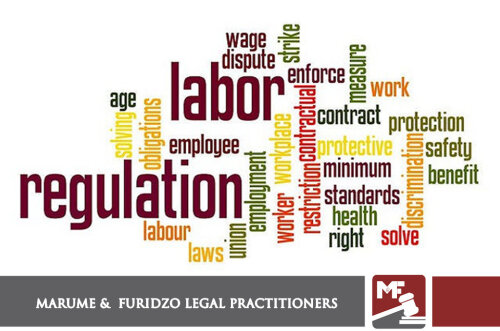Best Employment & Labor Lawyers in Harare
Share your needs with us, get contacted by law firms.
Free. Takes 2 min.
List of the best lawyers in Harare, Zimbabwe
About Employment & Labor Law in Harare, Zimbabwe
Employment and Labor Law in Harare, Zimbabwe, is governed by several statutes that aim to protect the rights of employees and employers while promoting fair labor practices. The core of these laws is encapsulated in the Labor Act, which sets standards for employment contracts, wages, work hours, and dispute resolution processes. Additionally, the Employment Act, Collective Bargaining Agreements, and various sector-specific regulations ensure that diverse employment contexts are addressed. These laws seek to maintain a balance between providing adequate employee protections and allowing businesses to operate efficiently.
Why You May Need a Lawyer
Engaging a lawyer specializing in Employment & Labor Law can be crucial in several situations. Employees might need legal assistance when facing unfair dismissal, discrimination, or harassment in the workplace. Employers, on the other hand, may seek counsel to ensure compliance with labor laws, draft employment contracts, or handle workplace disputes effectively. Lawyers can also provide vital guidance during collective bargaining negotiations or represent parties in labor court proceedings to ensure that their rights and interests are accurately represented.
Local Laws Overview
The Labor Act is the primary legislation governing employment relationships in Harare. It deals with various aspects such as minimum wage standards, employee benefits, and working conditions. Key components include:
- Employment Contracts: Legal requirements pertain to the terms, conditions, and termination of employment contracts.
- Wages & Salaries: Regulations ensure that employees receive fair compensation, including regular salary and overtime pay.
- Working Hours: Standards for normal working hours and rest periods to protect workers' health and welfare.
- Dispute Resolution: Processes for resolving employment-related disputes through mediation, arbitration, and labor courts.
- Safety & Health: Laws aimed at ensuring safe and healthy working environments for all employees.
Frequently Asked Questions
What rights do employees have regarding termination of employment?
Employees are entitled to fair termination processes, including notice periods stipulated in their employment contract and severance pay as per statutory requirements.
How is overtime regulated in Zimbabwe?
Overtime is generally compensated at a rate of one-and-a-half times the normal hourly wage. Employees should not work more than 48 hours a week unless compensated for overtime.
What is the minimum wage in Harare?
The minimum wage varies by industry and is subject to adjustment through Collective Bargaining Agreements. It's essential to check the specific rate applicable to your sector.
Are there protections against workplace harassment?
Yes, employees are protected from workplace harassment, including any unwanted conduct that affects their dignity or creates a hostile work environment.
Can an employer change the terms of an employment contract unilaterally?
No, any significant changes to employment terms usually require employee consent or negotiation through collective bargaining processes.
How are employment disputes resolved in Zimbabwe?
Employment disputes can be resolved through mediation, conciliation, arbitration, or by taking the matter to the Labor Court, depending on the nature of the dispute.
What leave entitlements do employees have?
Employees are generally entitled to annual leave, sick leave, and maternity leave, the specifics of which depend on legislative stipulations and employment contracts.
What is the role of trade unions in Zimbabwe?
Trade unions represent workers' interests, particularly in negotiations related to wages, working conditions, and collective bargaining agreements.
Are there laws concerning workplace safety?
Yes, the Zimbabwean government enforces laws that require employers to provide safe working conditions and take preventive measures against hazards.
How does one enforce labor rights in Zimbabwe?
Labor rights can be enforced by filing a complaint with relevant authorities like the Ministry of Labor, or through legal proceedings in labor courts, often with professional legal assistance.
Additional Resources
Individuals seeking further information or assistance can contact or engage with the following resources:
- Ministry of Labor, Public Service and Social Welfare: Overseeing labor regulations and providing assistance on employment issues.
- Zimbabwe Congress of Trade Unions (ZCTU): A national trade union center offering resources and support for workers.
- Legal Practitioners: Lawyers specializing in employment and labor law offer significant insights and representation.
- Human Resources Institutes or Councils: They can provide consultancy services and labor law updates.
Next Steps
If you need legal assistance in Employment & Labor issues in Harare, consider taking these steps:
- Identify the Issue: Clearly define the employment-related issue you are facing.
- Gather Documentation: Collect all relevant documents, such as employment contracts, correspondence, or pay slips.
- Research Lawyers: Look for reputable lawyers or law firms specializing in labor law, possibly through recommendations or directories.
- Consultation: Schedule a consultation to discuss your issue with a legal professional to understand your options.
- Proceed With Legal Action: If necessary, proceed with arbitration, mediation, or court action as advised.
Lawzana helps you find the best lawyers and law firms in Harare through a curated and pre-screened list of qualified legal professionals. Our platform offers rankings and detailed profiles of attorneys and law firms, allowing you to compare based on practice areas, including Employment & Labor, experience, and client feedback.
Each profile includes a description of the firm's areas of practice, client reviews, team members and partners, year of establishment, spoken languages, office locations, contact information, social media presence, and any published articles or resources. Most firms on our platform speak English and are experienced in both local and international legal matters.
Get a quote from top-rated law firms in Harare, Zimbabwe — quickly, securely, and without unnecessary hassle.
Disclaimer:
The information provided on this page is for general informational purposes only and does not constitute legal advice. While we strive to ensure the accuracy and relevance of the content, legal information may change over time, and interpretations of the law can vary. You should always consult with a qualified legal professional for advice specific to your situation.
We disclaim all liability for actions taken or not taken based on the content of this page. If you believe any information is incorrect or outdated, please contact us, and we will review and update it where appropriate.
Browse employment & labor law firms by service in Harare, Zimbabwe
Harare, Zimbabwe Attorneys in related practice areas.















